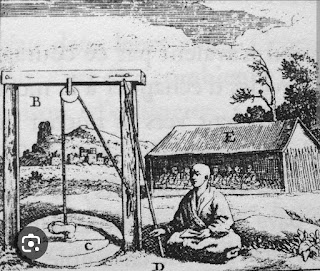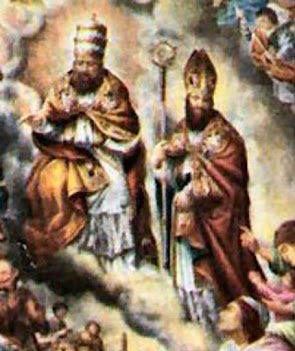September 30 is Feast Day of Saint Jerome. Saint Jerome is a person one can easily identify with: As a young man drawn to libertinage, with a curious mind, he learns to stand on principle, eventually becoming an ascetic and a Bible Scholar. Saint Jerome was a Feminist, and an easy target of the noted Porphyry's accusation that the Christian communities were run by women and that the favor of the ladies decided who could accede to the dignity of the priesthood. Stubborn with a bad temper, Jerome could use a vitriolic pen, but his love for God and for Jesus Christ was extraordinarily intense; anyone who taught error was an enemy of God and truth, and Saint Jerome went after him or her with his eloquence and sometimes sarcasm. As Winston Churchill said, "You have enemies? Good. That means you’ve stood up for something, sometime in your life."
Traditionally, Saint Jerome is regarded as the most learned of the Latin Fathers
St. Jerome, patron saint of irascible, morbidly sensitive old curmudgeons
Saint Jerome, nee Eusebius Sophronius Hieronymus was born at Stridon around 342–347 AD but not baptized until about 360–369 in Rome, where he had gone with his friend Bonosus of Sardica to pursue rhetorical and philosophical studies. By his own admission, as a student, Jerome indulged himself but was remorseful, suffering terrible bouts of guilt afterwards. To appease his conscience, on Sundays he visited the sepulchers of the martyrs and the Apostles in the catacombs. This experience reminded him of the terrors of Hell.
In a piece published in Aleteia, Philip Koslosky writes: "Anger is a feeling, and in itself it is not sinful. It is even possible that anger can spur us on to do something heroic and stand up for those who are being persecuted. St. Jerome was known to lash out at people and spew angry comments, but it was his repentance that saved him"
The Gospel of Saint Matthew in Chapter 21 describes Jesus cleansing the Temple
"Jesus entered the temple area and drove out all those engaged in selling and buying there. He overturned the tables of the money changers and the seats of those who were selling doves. And he said to them, “It is written: ‘My house shall be a house of prayer,’ but you are making it a den of thieves.”
Jerome is often pictured with a stone, which he would use to beat his chest as he repented for his sins. Once, upon seeing a painting of the great saint, Pope Sixtus V commented: “You do well to carry that stone, for without it the Church would never have canonized you.”
He eventually became a master of Latin, Greek, Hebrew, and Chaldaic. After his preliminary education, he went to Rome, then to Trier, Germany. He spent several years in each place, always trying to find the very best teachers. As protégé of Pope Damasus I, and in order to put an end to the marked divergences in the western texts of that period, Pope Damasus encouraged Jerome to revise the available Old Latin versions of the Bible into a more accurate Latin on the basis of the Greek New Testament and the Septuagint, resulting in the Vulgate - Jerome undertook a revision of the Vetus Latina Gospels based on Greek manuscripts. He also updated the Psalter containing the Book of Psalms then in use in Rome, based on the Septuagint. The Vulgate was adopted as the Bible text within the Western Church. Ot eventually eclipsed the Vetus Latina. By the 13th century it had taken over from the former version the designation versio vulgata (the "version commonly used") or vulgata for short.
According to SBC Called, a Bible translator works in a cross-cultural context to facilitate the translation of the Word of God into the heart language of a local people. The goal of every Bible translation project is to produce a translation that is clear, accurate, natural, and acceptable to the people for whom it is translated. In order for a people group to meaningfully engage with the Bible and be transformed by its message, exegetical accuracy, linguistic naturalness, and cultural sensitivity are vital aspects of a translation.
Jerome was known for his teachings on Christian moral life, especially to those living in cosmopolitan centers such as Rome. In many cases, he focused his attention on the lives of women and identified how a woman devoted to Jesus should live her life. This focus stemmed from his close patron relationships with several prominent female ascetics who were members of affluent class. The resulting inclination of these women towards the monastic life, away from the indulgent lasciviousness in Rome, and his unsparing criticism of the secular clergy of Rome, brought a growing hostility against him among the Roman clergy and their supporters. Soon after the death of his patron Pope Damasus I on 10 December 384, Jerome was forced to leave his position at Rome after an inquiry was brought up by the Roman clergy into allegations that he had an improper relationship with the widow Paula.
Jerome traveled extensively in Palestine, marking each spot of Christ’s life with an outpouring of devotion. He spent five years in the desert of Chalcis giving himself up to prayer, penance, and study. Finally, he settled in Bethlehem, where he lived in the cave believed to have been the birthplace of Christ. Jerome died in Bethlehem, and the remains of his body now lie buried in the Basilica of St. Mary Major in Rome.
Koslosky concludes: "What separates us from the saints is not our mistakes, but our ability to ask forgiveness from God and others. If we do that, we have much more in common with the saints that we might expect."













